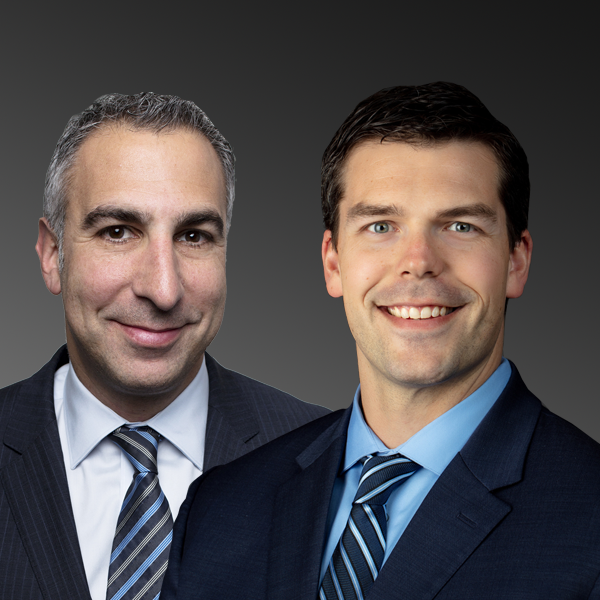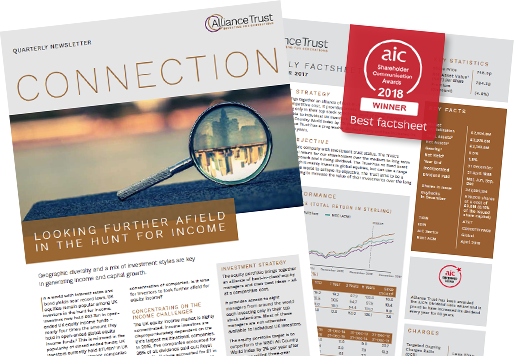With mainstream media headlines highlighting data privacy at Facebook, corporate scandals at Uber and the ever-present threat of climate change, it’s no wonder that there’s growing interest in environmentally and socially aware investments. Recent results from a variety of YouGov polls, have found that over half of respondents who hold investments, want their savings to have a positive impact on the world beyond just generating investment returns.
However, each fund does something slightly different in terms of how it invests, and a wide variety of terms are used to describe their approaches. So it’s tough for investors to work out what each one is doing, and whether it’s in line with their own principles.
Our beliefs
With the exception of controversial weapons, which are illegal in many countries, Alliance Trust doesn’t currently place any ethical or value based restrictions on the types of company that can be invested in for the Trust’s portfolio, although this is kept under review and may change in the future. As a general principle, we prefer to engage with companies on how they run their businesses, rather than having blanket exclusions on certain industries or sectors. However, as responsible long-term investors, we believe it’s essential to integrate environmental, social and governance (ESG) factors into the Trust’s investment processes, because it can help manage risks better, improve returns and have a positive impact on society. Put simply, we believe an investment approach that integrates responsible investing effectively, will outperform one that does not, over the long term. While the results of studies vary, the evidence for this approach is compelling. (See list of studies at the end of this article.)
Turning beliefs into action
Broadly speaking, the Trust has three lines of defence to help manage ESG risks:
1. All the managers Willis Towers Watson (WTW) selects to pick stocks for the portfolio, are vetted to make sure they meet minimum standards for assessing ESG risks in the companies they invest in. In addition to ensuring ESG risks are integrated within stock picker decision-making, managers are also expected to be good stewards of their capital:
- WTW expects managers to vote at company meetings.
- Between 1 January and 30 December 2019, the stock pickers cast 3,082 votes, voting against or abstaining at 344 of these.
- Of the votes against management, the key topics were Board Structure, with 38.1% of the votes, as well as Capital Structure and Remuneration, both representing over 20% of votes.
2. WTW, itself a thought-leader on responsible investing, monitors the managers and the stocks they pick for the portfolio, using proprietary data and third-party tools, challenging them when necessary to justify a holding, as well as monitoring the ESG risks and opportunities at a total portfolio level.
3. Equity Ownership Services (EOS) at Federated Hermes, an external, independent ESG expert, has been appointed. It:
- Shares its expertise with WTW and our stock pickers about ESG issues.
- Engages with the companies we invest in, to help effect positive change, and makes recommendations on how our stock pickers should vote at company meetings.
- Represents a wide range of institutional asset managers and asset owners, such as pension schemes, and, collectively, has over $662bn of assets under advice.
- This gives the collective views of the asset managers and owners that EOS at Federated Hermes represents more leverage when lobbying for corporate change than one investor acting alone.
- EOS at Federated Hermes also engages with policymakers.
Active ownership drives positive change
We think being active owners and constructively engaging with companies is often more likely to lead to positive outcomes than simply walking away, and having EOS at Federated Hermes on our side, helps us punch above our weight. Since its appointment in June 2019, EOS at Federated Hermes has engaged on a range of 248 ESG issues/objectives with 65 companies held by the Trust. These engagements are typically multi-year endeavours, but in this short time, it has recorded progress on 23% of its objectives.
"Ahead of the curve" on ESG investing
We believe these three lines of defence put the Trust at the forefront of efforts to integrate ESG into our investment processes. Indeed, this was acknowledged by broker Winterflood, which said,
“Alliance Trust seems to be ahead of the curve” on ESG investing.
“We believe that it (the Trust) is benefiting from Willis Towers Watson’s resources and capability in this regard and we see the appointment of EOS at Federated Hermes as a positive step in leading engagement,” explained Winterflood.
We are pragmatic
While our priority is to generate attractive returns for shareholders, and we believe the best way to do that is by being responsible investors, we are pragmatic. In some cases, the mispricing of ESG risks can lead to investment opportunities, which can deliver attractive returns. So, in principle, we are prepared to invest in stocks that at first appearance have weaker ESG profiles, such as tobacco and oil stocks for example, when our stock pickers believe the risks are more than compensated for by the low price of a stock relative to the company’s long-term earnings power, especially when those companies have demonstrated a willingness to change for the better.
- For example, BP is in the portfolio. The concerns about the company are to do with the fact that it is an energy company, exposed to fossil fuels. Despite this, BP is highly ranked among peers in terms of ESG risk. BP has been investing in renewables and looking to improve its reporting and transition risk management. Many oil and gas companies are here to stay for the foreseeable future, and in many cases are part of the solution of working towards a transition to a low-carbon economy. Therefore, we feel comfortable focusing on the better operators in the space, engaging with them to address climate-related issues. Better outcomes may well be best achieved through engagement by shareholders, than from divesting from the sector completely. Companies such as BP don’t really need additional equity capital from financial markets, and so reducing the pool of potential investors is unlikely to have a significant impact on company strategy. Instead shareholder engagement is more likely to have a positive impact, as was seen at the recent BP AGM, with the shareholder resolution tabled by Climate Action 100+, which aims to ensure BP provides better climate-related reporting and aligns each new material capital investment with the goals of the Paris Agreement on climate change. The resolution was co-filed by EOS at Federated Hermes and our manager Jupiter and passed with near unanimous shareholder support. As a result, we expect better disclosure and, over time, a shift in BP’s fuel mix towards lower carbon intensity.
- HeidelbergCement, which produces and distributes cement worldwide, is another holding that emits significant amounts of carbon. However, from an ESG perspective, HeidelbergCement is one of the industry’s leaders. It has very strong corporate governance, solid ESG policies, has joined the United Nations Global Compact (UNGC) and is the first cement company to have the Science Based Targets initiative (SBTi) to verify that its CO2 reduction targets (for 2030) conform to the requirements of the Paris Agreement. The international non-profit organisation CDP (formerly Carbon Disclosure Project) has recognised HeidelbergCement with a place on the ‘Climate Change A-List 2019’, as one of the leading companies worldwide for its commitment to climate action. The company has implemented numerous projects towards the goal of reducing its carbon footprint, including carbon capture and storage methods, recycling absorbed CO2 into marketable building materials, and using CO2 for algae cultivation. In addition, HeidelbergCement employs a region-specific biodiversity protection and quarry rehabilitation approach. In aggregate, the climate risk exposures of the Trust’s portfolio were lower than the benchmark at the end of 2019; we also had lower exposure to companies owning fossil fuel reserves, although that was a point in time and our exposures may be higher than the benchmark at other times, depending on the shares we own.
Examples of empirical evidence
1. Clark, Feiner, Viehs. From the Stockholder to the Stakeholder, University of Oxford, Arabesque Partners, 2014. This used research from Clark, Viehs. The Implications of Corporate Social Responsibility for Investors, 2014.
- Based on more than 190 sources.
- “90% of the studies on the cost of capital show that sound sustainability standards lower the cost of capital of companies”
- “88% of the research shows that solid ESG practices result in better operational performance of firms”
- “80% of the studies show that stock price performance of companies is positively influenced by good sustainability practices”
2. Fulton, Kahn, Sharples. Sustainable Investing; Establishing Long-Term Value and Performance, Deutsche Bank, 2012.
- Based on more than 100 academic studies.
- “100% of academic studies agree that companies with high ratings for… ESG have a lower cost of capital in terms of debt (loans and bonds) and equity”
- “89% of the studies… show that companies with high ratings for ESG factors exhibit market-based outperformance”
- Within ESG, governance (‘G’) is often found to be the most influential factor.
- However studies of funds applying an exclusionary approach have tended to achieve mixed results.
3. Friede, Busch, Bassen. ESG and financial performance: aggregated evidence from more than 2000 empirical studies, Journal of Sustainable Finance & Investment, Deutsche Bank & University of Hamburg, 2015.
- A second-level review study, covering 60 review studies (3,718 underlying studies, and when taking out duplicates, this leads to 2,200 unique studies).
- The business case for ESG investing is empirically very well founded.
- Roughly 90% of the studies find a non-negative ESG-CFP (corporate financial performance) relation. The large majority of studies report positive findings.
4. Dimson, Karakas, Li. Active Ownership, Review of Financial Studies, 2015.
- Engagements with investee companies on average generated abnormal returns of 2.3% one year following the initial engagement in the US from 1999-2009. This study examined 2,152 highly intensive engagements on ESG areas for 613 US public firms. The success rate for engagements was 18%, and on average it took 2-3 engagements before success could be recorded, which on average was 1.5 years after the initial engagement.
Explore more investment expertise






